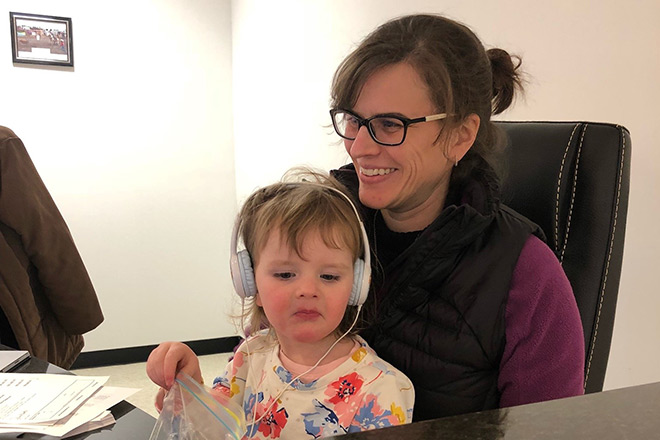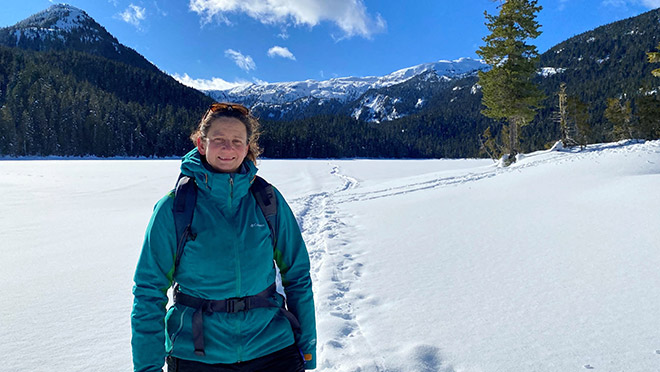Women's network builds connections, breaks down barriers at BC Hydro

Mentorship and support help boost career opportunities
Heather Middleton is a longtime BC Hydro manager and an avid supporter of an in-house women's network that helps pave the way for rewarding careers at BC Hydro. In the leadup to International Women's Day on March 8, Middleton – regional manager of BC Hydro's environmental field operations on Vancouver Island and in northern B.C. – took time to chat about how BC Hydro's Women's Network and the company's focus on inclusion, diversity, equity, and accessibility are helping women like her.
About a third of BC Hydro's employees are women, and there are five women and four men on the executive leadership team. Our Board of Directors also brings diverse experience, perspectives, and ideas to the oversight they provide to our executive management. While BC Hydro's leadership acknowledges that gender parity is a move in the right direction, there's more to be done. They're committed to equal pay for equal work, are seeing a reduction in gender-based pay gaps, and recognize that the Women's Network is playing a leading role in helping make that happen.
Middleton began her BC Hydro career as a manager in training nearly 15 years ago, and started attending Women's Network events. She's an active member today, and a huge fan of how the network acts in part as a way to provide feedback to BC Hydro on any existing barriers to women within the company.
"The leadership team of the Women's Network is amazing," she says. "One thing I really appreciate is how hard the network has worked to engage people in the regions around B.C. We've worked to strengthen those connections, and to make events accessible to everyone."
And then there's the Women's Network's mentorship triad program, which connects three women in BC Hydro who are at different stages of their careers. "They connect at least six times a year, so that you're constantly getting feedback and advice from others," she says. "There are about 100 women per year in that program – that's 30-plus triads."

Work, family, and a taste of political life
Middleton's job often takes her on the road, and for a few days in February, meetings took her away from her Campbell River home and her two children.
"I'm talking to you from Vancouver, and my husband is parenting at home," says Middleton, who combines virtual meetings with travel in her job as a regional manager.
Raised in Victoria, Middleton's path to BC Hydro – and even within BC Hydro – has been anything but ordinary. After doing her undergrad at Queen's University, she got her Master of Science, in nature, society, and environmental policy, at Oxford University. After starting her BC Hydro career as a manager in training in Vancouver, she headed to Hudson's Hope – a 13-hour drive north of Vancouver – where she eventually managed planning for all maintenance and coordination with capital projects at two of BC Hydro's largest hydroelectric generation facilities, GM Shrum and Peace Canyon.
"I enjoyed my time in Hudson's Hope and created many memories with my family there," she says. "And I was fortunate to get involved in operations management. There weren't that many women taking on that kind of role at the time."
It was at Hudson's Hope that she also met her husband (also a BC Hydro employee), started a family, and successfully ran for city council, sometimes taking her infant daughter with her to council meetings.
"Being on council for four years definitely wasn't an easy thing to do," she says. "But I've always been passionate about service and giving back to my community. I have a really supportive family and an employer who's encouraging in support of people who are choosing to follow their passions inside and outside the workplace."
'Barriers are falling, but there's still work to do'
Middleton recalls that when she first joined BC Hydro and began working in the field, safety clothing and equipment was only available in men's sizing, so she watched women, particularly petite women, struggle with ill-fitting equipment. She's glad to see that today there's been an increased supply of gear sized for women.
"I think there have always been barriers to women, and to many other minority groups," she says, noting that the Women's Network has provided important visibility into women’s issues in the workplace. "But I think things have changed and will continue to change."
BC Hydro has been recognized as one of B.C.'s Top Employers, one of Canada's Best Diversity Employers, and one of Canada's Best Employers for Young People. And Middleton says that for women at BC Hydro, role models aren't hard to find. She took heart as a new employee when she saw female engineers at the facilities she was working at, and she sees the workplace continuing to evolve.
"I've seen an increase in the number of women who say 'I have women whose career path I admire and which I can live up to'," she says. "That wasn't there consistently before."
At BC Hydro, we continue to focus on how we can support community efforts to encourage women and girls to choose careers in STEM (Science, Technology, Engineering, and Math). We also work with BC Stats – the Government of B.C.'s statistical and economical research and analysis service – to take a comprehensive look at how diverse groups are compensated at BC Hydro.
The Women's Network continues to play a leading role in creating positive cultural change at BC Hydro. Since its inception in 2004, the network has grown to more than 750 members, offering opportunities ranging from book clubs, to leadership training, to a new parents support group.
"It can be quite disorienting when you leave the workplace for six months or more, then come back balancing your new family responsibilities along with your role as an employee," says Middleton. "So having a place where women can bounce questions off others who have gone through it all before can really help."
Related:
